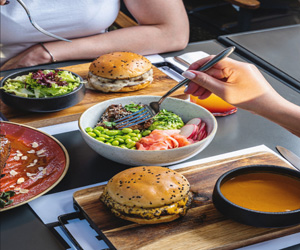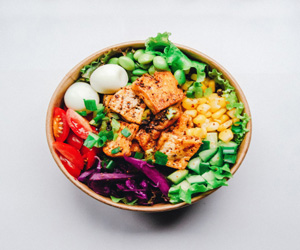


Exploring The Benefits Of Organic Options
In a world where consumers are becoming increasingly health-conscious and environmentally aware, organic options have gained significant popularity. These products, whether in the form of food, cosmetics, or clothing, are grown, processed, and manufactured without the use of synthetic chemicals, pesticides, or genetically modified organisms. Embracing organic options goes beyond just a trend; it's a conscious choice that brings numerous benefits to both individuals and the planet.
Quality Nutrition: Organic food products are known for their superior nutritional content. Because they are cultivated in nutrient-rich, well-balanced soil without the aid of synthetic fertilizers or pesticides, they often contain higher levels of vitamins, minerals, and antioxidants. This means that by choosing organic options, you're not only reducing your exposure to harmful chemicals but also improving your intake of essential nutrients.
Reduced Exposure To Pesticides: One of the primary reasons people turn to organic options is to minimize their exposure to pesticides. Conventionally grown crops are often treated with synthetic pesticides and herbicides that can leave residues on food. By opting for organic fruits, vegetables, and grains, you can significantly reduce your intake of these potentially harmful chemicals.

Preservation Of Soil Health: Organic farming practices focus on maintaining the long-term health of the soil. These methods prioritize crop rotation, composting, and the use of natural fertilizers. By nurturing the soil in this way, organic agriculture supports its fertility and structure, ensuring it remains a viable resource for future generations.
Environmental Benefits: Choosing organic options also has a positive impact on the environment. Organic farming practices are less harmful to ecosystems, as they avoid the use of synthetic chemicals and genetically modified organisms. This approach helps preserve biodiversity, protect pollinators, and reduce the risk of soil and water pollution.
Supporting Sustainable Agriculture: Organic options are closely linked to sustainable agriculture, which promotes ethical and environmentally friendly practices. Sustainable farming methods not only protect the environment but also support the livelihoods of farmers. By purchasing organic products, you're contributing to a more sustainable and fair agricultural system.
Cleaner And Safer Cosmetics: Organic options extend beyond the realm of food. Organic cosmetics and personal care products are also available, offering consumers a safer and more natural way to care for their bodies. These products are typically free from harmful synthetic chemicals, making them a healthier choice for both your skin and the planet.
Transparency And Certification: Organic options are subject to stringent certification standards in many countries. These standards ensure that products labeled as "organic" meet specific criteria. This certification provides consumers with transparency and confidence in the products they purchase.
A Personal Choice With Global Impact: Choosing organic options is a personal decision that can have a significant impact on a global scale. It not only benefits your health and well-being but also contributes to a more sustainable and environmentally conscious future.
Organic options are more than just a passing trend; they represent a conscious choice that brings numerous benefits. By selecting organic food, cosmetics, and other products, you're making a commitment to your health, the environment, and the sustainability of agriculture. While organic options may come at a slightly higher price point, many people view this as an investment in their well-being and the future of the planet.
A Culinary Hug For The Soul

One of the remarkable things about comforting dishes is their versatility. They can be found in virtually every culture, and each culture has its unique take on what constitutes comfort food. In the United States, it might be a classic grilled cheese sandwich and tomato soup. In Italy, a hearty plate of pasta al ragù. In India, a bowl of creamy, aromatic chicken tikka masala. The diverse nature of comforting dishes reflects the universality of seeking comfort through food.
Comforting dishes hold a special place in our hearts, not only because they taste good, but because they evoke powerful emotions. They are linked to cherished memories—family gatherings, holidays, or a friend's comforting gesture during tough times. The mere scent of a dish can instantly transport you to a place of happiness and security.
The Delight Of Wholesome Recipes
 Simplicity And Freshness: Wholesome recipes embrace the beauty of simplicity. They rely on the natural flavors and textures of ingredients without overcomplicating dishes with excessive additives or processed foods. This simplicity not only makes the recipes easier to prepare but also allows the purity of each ingredient to shine through.
Simplicity And Freshness: Wholesome recipes embrace the beauty of simplicity. They rely on the natural flavors and textures of ingredients without overcomplicating dishes with excessive additives or processed foods. This simplicity not only makes the recipes easier to prepare but also allows the purity of each ingredient to shine through.
Culinary Creativity: Wholesome recipes are not limited to bland or boring dishes. In fact, they are an opportunity for culinary creativity. Home cooks can experiment with a wide variety of fresh ingredients, herbs, and spices to create meals that are not only delicious but also nutritious.
Nourishing, Efficient, And Satisfying
 Financial Savings: Meal preparation can save money. Eating out at restaurants or ordering takeout can be expensive, and the costs add up over time. Meal preparation allows you to buy ingredients in bulk, plan cost-effective meals, and reduce food waste. It's a budget-friendly approach to dining.
Financial Savings: Meal preparation can save money. Eating out at restaurants or ordering takeout can be expensive, and the costs add up over time. Meal preparation allows you to buy ingredients in bulk, plan cost-effective meals, and reduce food waste. It's a budget-friendly approach to dining.
Reduced Food Waste: Meal preparation encourages thoughtful planning, which can help reduce food waste. You can buy ingredients with specific recipes in mind, use leftovers creatively, and ensure that perishable items are consumed before they go bad. This contributes to a more sustainable and eco-friendly way of eating.
Variety And Convenience: Meal preparation doesn't mean eating the same dish every day. With careful planning, you can enjoy a diverse menu throughout the week. You can also pack ready-to-eat meals for work, travel, or outings, ensuring that you always have a satisfying and nutritious option on hand.
Stress Reduction: Knowing that your meals are ready and waiting can reduce daily stress. You don't have to rush to prepare food after a long day at work, and you won't have to make last-minute decisions about what to eat. Meal preparation brings peace of mind, streamlining your daily routine.
Embracing Simplicity In A Complex World
 Embracing Minimalism: At its core, "back to basics" promotes minimalism. It encourages people to declutter their lives, both physically and mentally. Minimalism is about focusing on what truly matters and eliminating the excess. It's the realization that more possessions, busyness, or complexity do not necessarily lead to greater happiness or fulfillment.
Embracing Minimalism: At its core, "back to basics" promotes minimalism. It encourages people to declutter their lives, both physically and mentally. Minimalism is about focusing on what truly matters and eliminating the excess. It's the realization that more possessions, busyness, or complexity do not necessarily lead to greater happiness or fulfillment.
Simplicity In Daily Living: In a world of constant distractions and information overload, "back to basics" encourages us to simplify our daily routines. This could mean cultivating habits like mindfulness, time management, and gratitude. It's about savoring the present moment, fostering deep connections, and finding joy in life's simple pleasures.
Health And Well-Being: The "back to basics" approach extends to health and well-being. It advocates for a return to whole, unprocessed foods, regular exercise, and stress reduction techniques. Prioritizing a balanced, natural diet and physical activity can lead to improved physical and mental health, reducing the reliance on pharmaceutical interventions.
A Look At The Evolution And Impact
 Perceived Health Benefits: Some people believe that eliminating gluten from their diet can lead to improved digestion, weight loss, and increased energy. However, the scientific consensus on these claims remains inconclusive.
Perceived Health Benefits: Some people believe that eliminating gluten from their diet can lead to improved digestion, weight loss, and increased energy. However, the scientific consensus on these claims remains inconclusive.
Celebrities And Influencers: High-profile celebrities and social media influencers have helped popularize gluten-free diets by sharing their personal experiences and endorsing gluten-free products.
Growing Gluten-Free Market: The food industry has recognized the demand for gluten-free products, resulting in an expansion of gluten-free options and a significant increase in gluten-free product availability.
The Gluten-Free Food Industry
The gluten-free trend has not only influenced consumer behavior but has also significantly impacted the food industry. Gluten-free product sales have skyrocketed, leading to an influx of gluten-free alternatives in various categories, from bread and pasta to snacks and baked goods. This trend has also led to an increased demand for gluten-free labeling and certification, promoting transparency for consumers.
Sip Your Way To Health And Vitality
 One of the primary benefits of nutrient-dense refreshments is their ability to deliver a substantial dose of vitamins and minerals. For instance, green smoothies loaded with leafy greens like spinach and kale provide essential vitamins such as A, C, and K, along with minerals like potassium and magnesium. These nutrients play a pivotal role in supporting your immune system, promoting healthy skin, and maintaining proper muscle and nerve function.
One of the primary benefits of nutrient-dense refreshments is their ability to deliver a substantial dose of vitamins and minerals. For instance, green smoothies loaded with leafy greens like spinach and kale provide essential vitamins such as A, C, and K, along with minerals like potassium and magnesium. These nutrients play a pivotal role in supporting your immune system, promoting healthy skin, and maintaining proper muscle and nerve function.
Antioxidant-Rich Elixir
Antioxidants are like the superheroes of the nutrition world, defending your body against free radicals and oxidative stress. Nutrient-dense refreshments are often teeming with antioxidants derived from fruits, vegetables, and superfoods like berries, beets, and turmeric. These antioxidants help protect your cells from damage, reduce inflammation, and support your overall health.
The Key To Stress-Free Cooking
 Why does kitchen efficiency matter? In a nutshell, it's the difference between an enjoyable cooking experience and a stressful chore.
Why does kitchen efficiency matter? In a nutshell, it's the difference between an enjoyable cooking experience and a stressful chore.
Here are a few reasons why it's worth investing in kitchen efficiency:
1. Time-Saving: In our busy lives, time is a precious commodity. An efficient kitchen allows you to prepare meals more quickly, leaving you with more time for other important aspects of your life.
2. Reduces Stress: A cluttered, disorganized kitchen can add unnecessary stress to your meal preparation. Efficiency streamlines the process, so you can enjoy cooking without frustration.
3. Promotes Healthy Eating: When your kitchen is well-organized, you're more likely to make nutritious choices. Access to fresh ingredients and efficient tools can lead to better meal planning.